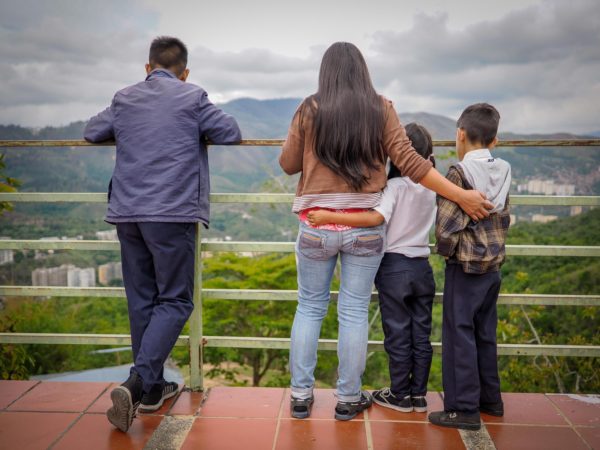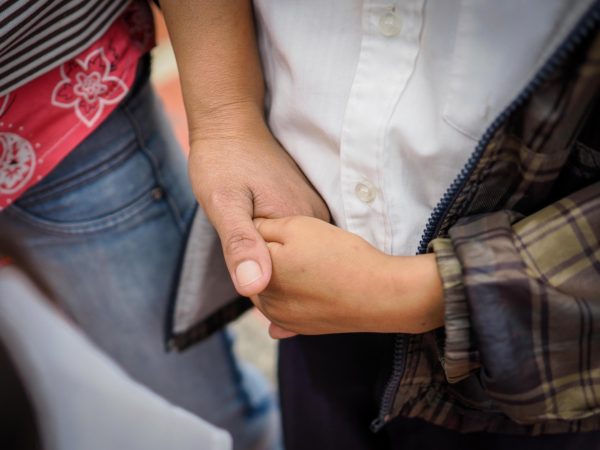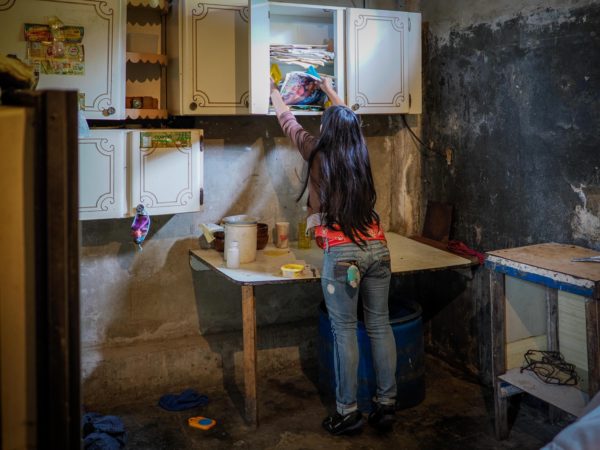Hidden in Plain Sight: A Venezuelan Survivor of Incest Speaks Out
CARACAS — Angela Pilay, 35, was only 13 years old when her father started abusing her.
This past June, we sat in an empty classroom at a Catholic school in Venezuela’s capital, where she works as a cook.
I was there to report on women’s and children’s rights in a country against political unrest, succeeding lawlessness, and an ongoing Covid pandemic. While foreign reporters have been frequently arrested, censored, or banned from the country, I came regardless to document human rights violations.

Pilay’s family had only moved to Venezuela from Ecuador, where she was born, the year before, after her father found a new job in Caracas and relocated the family back to their home country. Her two older siblings had turned 18 and already moved out of the house. After her mother left, only Pilay and her father remained.
“He forced me to form a couple with him, right after my mother left us for another man,” she said. “I was still a child.”
At first, Pilay said, she didn’t understand that it was abuse; her father didn’t use physical force — at least, not at first. But, over time, the abuse grew more frequent, and more violent.
A year later, Pilay became pregnant with the first of four children who would be born from incest, still a child herself at 14 years old. “I understood [then] that I would never be able to leave.”
Today, while she prepares lunch for the school children, her youngest daughter, seven-year-old Esperanza, and her 15-year-old son Yeremi — along with his 13-year-old brother Angel — come to the canteen and hug her in between classes.
Her first child with her father was a girl, a daughter named Andrea, who is now in her 20s. Pilay then had a boy, Yhon, now 17, and twins Yeremi and Yusepin.
Pilay later found a partner and gave birth to two more children — Angel and Esperanza — but her father forbade her to see him again.
“I decided to stay alive only to protect them,” Pilay told me through tears.

Pilay and her younger children remain living in the same house as their father. She has no other choice, she said, because she doesn’t earn enough to buy a house of her own or rent separate accommodation. With the minimum monthly salary equivalent to only about $28, most women victims of domestic abuse in Venezuela cannot afford to move away from their abusers.
From the onset of the pandemic, which continues to exacerbate an existing public health crisis, most women victims of domestic abuse have had to shelter in place at home with their perpetrators, resulting in staggering levels of violence. The Venezuelan organization Center for Justice and Peace (or CEPAZ) documented at least 62 femicides, along with 24 attempted femicides, in the first three months of this year alone — this, amid an ever-deepening, complex humanitarian emergency triggered by economic collapse that began in 2014.
Since then, the United Nations Independent International Fact-Finding Mission on the Bolivarian Republic of Venezuela has found reasonable grounds to believe that Venezuelan authorities have planned and executed serious human rights violations, some of which amount to crimes against humanity. Today, women’s rights activists, journalists, and even lawyers helping women continue to be threatened with imprisonment at the hands of security forces.
Caught in the throes of overlapping social and economic crises, women there have almost no resources to protect themselves or their children from harm. Violence against women remains prevalent throughout the country, hidden in plain sight.
While rights groups report that the prevalence of incest is high in Venezuela, official data remain largely unavailable. According to media reports, between January and September 2021, three cases of incest were registered in Táchira, one of Venezuela’s 24 states, including two child victims and one adult woman. The feminist organization Tinta Violeta said that it had provided support to at least six victims of incest across the country last year, most of whom suffered the abuse at the hands of their fathers, grandfathers, and uncles.
Abortion also remains banned for rape victims — including in cases of incest — with the only exception being to save the pregnant person’s life.
“Every day, a woman dies or is a victim of aggression because she is a woman,” said Franci Sánchez, a project manager for the feminist organization 100% Estrógeno, which assumes legal defense for victims of gender-based violence in Venezuela. “We are not even a number; we have been reduced to our bodies, often seen as objects, a property upon which others make decisions.”
But after two years of Covid lockdowns, victims are motivated to finally share their stories. At least, such is the case for Pilay.

I asked her if I could accompany her to the house where she still lives with her father and their children.
We met in her barrio and walked down the street, turning to descend a set of stairs that leads to her modest house. We must walk silently, she told me, as her father was upstairs.
In the space she shares with her children, Pilay has only one bed for all of them to sleep in. In the hall, there is one shower and a sewing machine (Pilay sews her children’s clothes herself). Apart from a few shelves, there is nothing else in her house. Pilay doesn’t have a kitchen; she gives her children food from the school.
When we arrived, she showed me a pile of documents: children’s birth certificates, family pictures, and the written statement she gave to police in June 2020, denouncing her father for physical and verbal abuse, which had worsened during the lockdowns, as well as for the sexual abuse she’s endured for years.
But, she said, nothing has changed. Her father was sentenced to three months of prison before moving back into the same house with her and the children. She told me she prays every day that he won’t come downstairs to her part of the house and start abusing them too.
As I left, I knew then that I would never forget what I saw in that house. While I observed a great deal of tenderness and love between Pilay and her children, I also saw true misery palpable across the space, ill-equipped for the needs of one person, let alone a mother with six children. And, worst of all, I bore witness to the immense trauma of a family that lives in constant fear of their father descending the stairs to repeat the cycle of sexual abuse.
Later, as I interviewed other victims of incest and domestic abuse across Caracas, I discovered that Pilay’s story was far from the exception.
Nothing can erase the trauma of incest, but in such political contexts as Venezuela’s, there are simply no mechanisms that exist to even acknowledge the pain of these victims. In the eyes of the country’s crumbling institutions, victims like Pilay and her children remain invisible, while perpetrators are shielded by low — or non-existent — penalties. In Pilay’s small house, I saw how incest thrives in places where women have neither rights nor recourse to justice.
More articles by Category: Gender-based violence, Girls, International, Violence against women
More articles by Tag: Latin America, Venezuela, Sexualized violence, Child Marriage



























